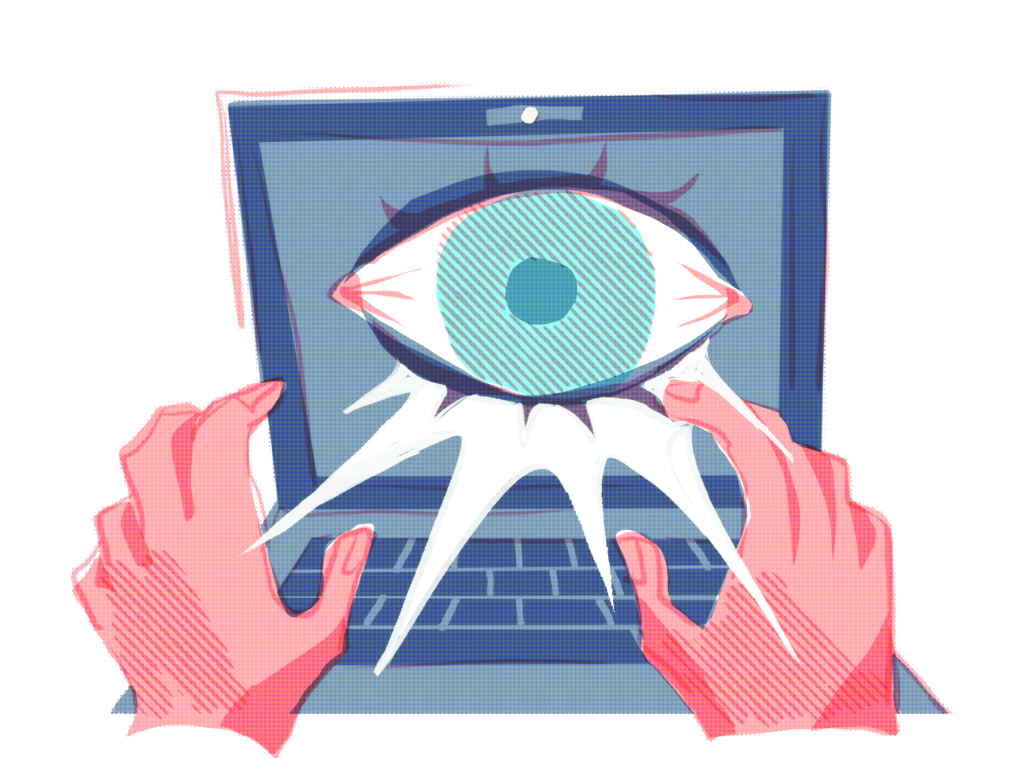
“On multiple occasions [I had friends who were reported through tracking software for sensitive behavior and sent to a counselor], [and] the counselors apologized, saying that it shouldn’t have been flagged,” said senior Felix Gee. “When [a person] vents to a friend [online and] one of those [messages] got flagged, it’s really awful.”
The extensions Blocksi and Hapara, as well as the software Bark, appear on all San Mateo Union High School District-issued Chromebooks. Hapara is used to track students on their computers during tests, while Blocksi and Bark use artificial intelligence to constantly track students’ activity.
AP Literature teacher Genevieve Schwartz has used Hapara since it was approved by the District last school year to ensure students do not use external sources on timed writes.
“[Hapara] creates a situation in which students have to generate their own writing, their own thinking, and it prevents that temptation [to go] to outside sources [such as] generative AI for ideas,” Schwartz said. “[In the past,] students have turned in timed write essays that were marked for AI-generated content.”
As for Blocksi and Bark, both track users 24/7 online. Blocksi employs AI to find what it believes to be sensitive information, which is then sent to human reviewers who determine whether to send the information to the school.
“My sister was writing an [assignment]for The Scarlet Letter’ and it got flagged [through Bark], and she had to go into the office and explain that she was just doing an assignment,” Moskewicz said. “I had another friend who got called into the office for something, [but] they couldn’t find the actual message, so she doesn’t know [why she was flagged].”
However, Chrome Web Store listed that Blocksi may not be supported in the future as it goes against Chrome guidelines. According to SMUHSD Director of Curriculum and Assessment Brian Simmons, Blocksi, which is not installed but is visible on the list of Chromebook extensions on school-issued computers, has not been approved for use by the district.
“We constantly ask ourselves whether [services are] invasive or not [and] we are constantly asking ourselves what is safe or not,” Simmons said. “It’s a fine line between data privacy and being a bit invasive.”
This past year, Gee has seen an increase in students being flagged, which he believes coincides with the appearance of Blocksi on the list of extensions on school-issued computers.
“Everybody has a right to their privacy, and when that’s breached, that’s really concerning,” Gee said. “I have a [personal] laptop so I can afford to not be tracked 24/7, but what if there’s a kid who doesn’t have that? They can’t do anything [personal] using [their Chromebook] because it can track you. What if you report somebody for expressing suicidal thoughts, what happens after they get sent to the hospital? Can their families afford that? Will their family be more distraught, more upset at them? There’s just so many factors.”
Others view all student monitoring services as a privacy breach.
“I feel like I’m getting punished [by] being watched [all] the time because students in the past cheated,” said junior Anya Kurinskas. “It makes me feel like I’m not trusted … because now I’m getting spied on.”
Assistant Principal David Moore, however, views the Chromebooks as property of the District and thus should reasonably be subject to searches by the administration.
“We tell students that these Chromebooks are not your property when you’re using them here on our server or anywhere you go on any other server, so they have to use it wisely,” Moore said. “Sometimes we get students [attempting] to view inappropriate sites on Chromebooks, and that’s a warning and a phone call home. Usually, it doesn’t happen again.”
As the extensions are only available on school-issued Chromebooks, some believe it is unfair for those who do not have access to personal computers.
“[When people] use their home computers, [they are] completely unrestricted,” Moskewicz said. “So it feels like preferential treatment towards the people who [have] MacBooks or laptops.”
Despite the use of Chromebook extensions for student safety, Gee advocates for more transparency.
“[Aragon] should tell us, or [tell us in] our assemblies [about Blocksi and other Chromebook extensions],” Gee said. “Every year, every time they change the software, they should have a physical consent form that is detailed and puts all this [information in] like, ‘Oh, we’re gonna track [you] 24/7.’”
There is a student technology agreement, the Acceptable Use Policy, that every parent and student signs via Aeries, however, not all of the specific tracking softwares are mentioned.



